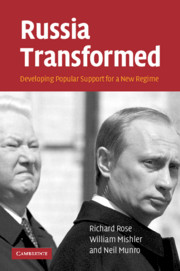Book contents
- Frontmatter
- Contents
- List of figures
- List of tables
- Acknowledgments
- Introduction Transformation and its aftermath
- 1 Time matters: the dynamics of regime support
- 2 The supply of regimes: democratic and autocratic
- 3 A changing supply of Russian regimes
- 4 Uncertainties of transformation: a view from the bottom
- 5 Changing levels of regime support
- 6 Social structure and the evaluation of regimes
- 7 The influence of political values and performance
- 8 Finding the economic influences that matter
- 9 The impact of the passage of time
- 10 What could challenge the new equilibrium?
- Appendix A New Russia Barometer samples
- Appendix B Coding of variables
- References
- Index
6 - Social structure and the evaluation of regimes
Published online by Cambridge University Press: 22 September 2009
- Frontmatter
- Contents
- List of figures
- List of tables
- Acknowledgments
- Introduction Transformation and its aftermath
- 1 Time matters: the dynamics of regime support
- 2 The supply of regimes: democratic and autocratic
- 3 A changing supply of Russian regimes
- 4 Uncertainties of transformation: a view from the bottom
- 5 Changing levels of regime support
- 6 Social structure and the evaluation of regimes
- 7 The influence of political values and performance
- 8 Finding the economic influences that matter
- 9 The impact of the passage of time
- 10 What could challenge the new equilibrium?
- Appendix A New Russia Barometer samples
- Appendix B Coding of variables
- References
- Index
Summary
It is not the consciousness of men that determines their being but, on the contrary, their social being that determines their consciousness.
Karl Marx, A Contribution to the Critique of Political EconomyThe unity of Russian society was a theme of both tsarist and Soviet writers, but every society is differentiated in many ways. Some differences have biological roots, such as gender and age; others reflect socioeconomic circumstances, such as income and education; and some are political, such as ethnic identity or pride in citizenship. The development of modern society increases differentiation within society, since the great bulk of the population no longer follows common rural pursuits, and modern communications make it easier for people to group themselves according to distinctive interests and tastes.
Socialization is a process in which individuals learn to fit into society in different ways, for example, as an unskilled worker or a highly educated professional. In this process, people develop distinctive interests and expectations about how the country ought to be governed. For adults continuing in a given role in society, whether as workers or members of an ethnic group, early socialization can reinforce initial evaluation. These interests and values can be invoked in the evaluation of the current and alternative regimes. Political sociology follows Marx in postulating that an individual's social being, that is, their position in the social structure, will influence their political consciousness.
*Hypothesis 1: Regime support depends on what individuals learn from their roles in society.
- Type
- Chapter
- Information
- Russia TransformedDeveloping Popular Support for a New Regime, pp. 106 - 123Publisher: Cambridge University PressPrint publication year: 2006



